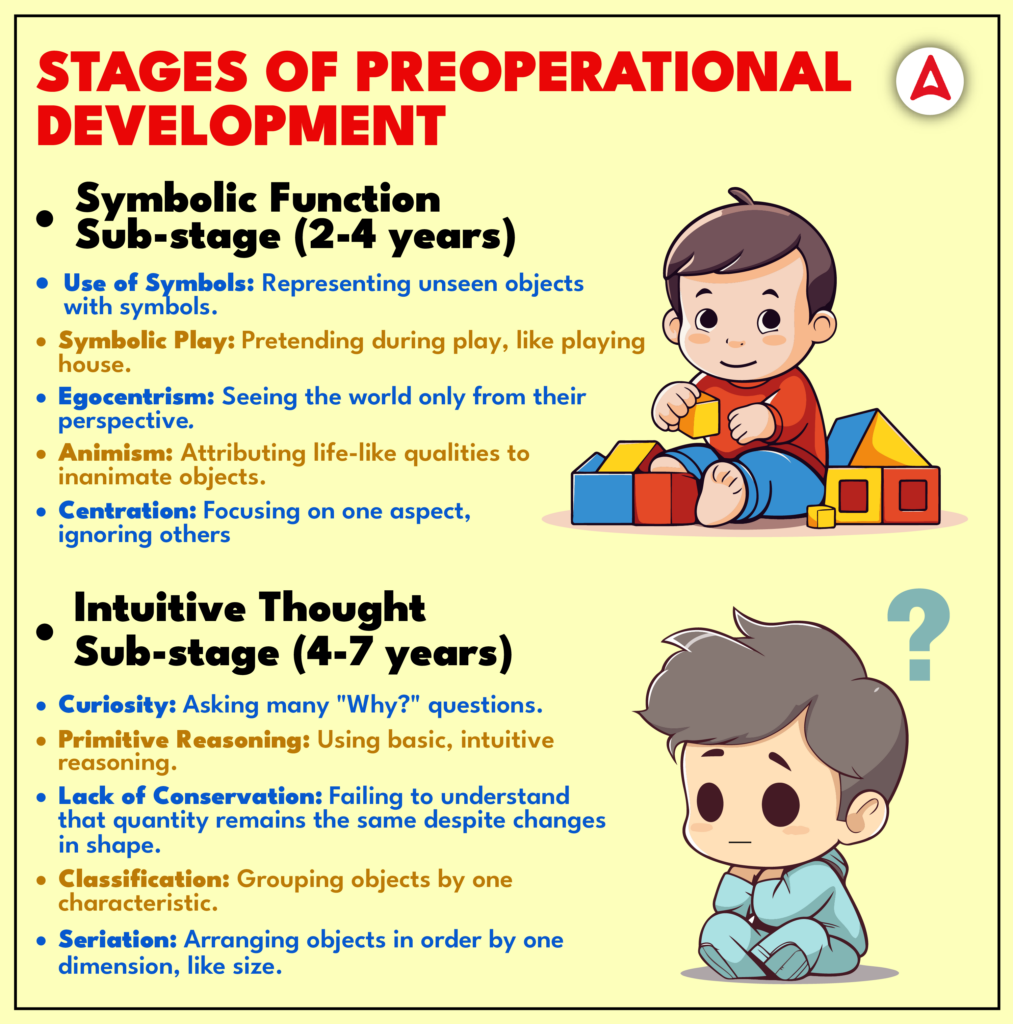Table of Contents
The preoperational stage is the second stage in Jean Piaget’s theory of cognitive development, occurring approximately between the ages of 2 and 7 years. During this stage, children begin to engage in symbolic play and learn to manipulate symbols, but they do not yet understand concrete logic. The preoperational stage is marked by rapid growth in language and thinking skills, though children’s reasoning is still based on immediate perceptions and their own perspectives.
Stages of Preoperational Stage
The preoperational stage is divided into two sub-stages: the symbolic function sub-stage and the intuitive thought sub-stage.

Symbolic Function Sub-stage (2-4 years)
During the symbolic function sub-stage, children begin to use symbols to represent objects that are not present. This is a significant leap from the sensorimotor stage, where knowledge is derived solely through physical interaction with the environment.
Key Characteristics:
- Symbolic Play: Children start engaging in pretend play, using objects to represent something else. For instance, a child might use a broomstick as a horse or a block as a car.
- Egocentrism: At this age, children have difficulty understanding perspectives other than their own. They assume that others see, hear, and feel exactly as they do.
- Animism: Children believe that inanimate objects have lifelike qualities and can act and feel as they do. For example, they might think that the sun is happy or that a teddy bear can feel sad.
- Centration: This is the tendency to focus on one aspect of a situation while ignoring others. A child might only consider the height of a liquid in a glass, not its width, when determining quantity.
Read Here : Piaget’s 4 Stages of Cognitive Development
Intuitive Thought Sub-stage (4-7 years)
In the intuitive thought sub-stage, children start to develop logical thinking but are not yet able to perform operations, which are reversible mental processes.
Key Characteristics:
- Curiosity and Questions: Children become very curious about the world and frequently ask “Why?” questions. This is the “age of questions” as they try to make sense of their environment.
- Primitive Reasoning: While children begin to use reasoning, it is still quite limited and based on intuition rather than logical analysis. They might make decisions based on immediate perceptions rather than understanding underlying principles.
- Lack of Conservation: Children do not understand the concept of conservation—the idea that quantity remains the same despite changes in shape or appearance. For instance, they might think that a stretched-out piece of clay has more volume than a compact ball of the same clay.
- Classification and Seriation: Although children start to classify objects by characteristics and can arrange objects in a series based on a single dimension (such as size), they still struggle with these concepts when they involve more than one attribute.
Common Activities and Examples
- Symbolic Function Stage: Playing house, drawing pictures of things that are not present, and mimicking adult behaviors like cooking or driving.
- Intuitive Thought Stage: Sorting objects by color or size, engaging in games that involve simple problem-solving, and asking numerous questions about how things work.
Educational Implications
Understanding the preoperational stage helps educators and parents provide appropriate learning experiences that match children’s cognitive abilities. Activities that involve symbolic play, storytelling, and simple problem-solving can greatly enhance cognitive development during this stage. It is also crucial to be patient with children’s egocentric views and to gently guide them towards understanding different perspectives and logical thinking processes.
Download Preoperational Stage Study Notes PDF
The direct Link to download the Preoperational Stage has been provided below. Candidate must click on below link to read “What is Preoperational Stage? Check Stages, Examples” in details for exam preparation.
Download Preoperational Stage Study Notes PDF




 UGC NET Study Notes for Paper 1, Downloa...
UGC NET Study Notes for Paper 1, Downloa...
 GSET Teaching Aptitude Questions and Ans...
GSET Teaching Aptitude Questions and Ans...
 समुद्र का पर्य�...
समुद्र का पर्य�...












